12 Career Options in Software Development
You have multiple ways to enter into a software development profession. It all comes down to the kind of work you're interested in, and the skills you have in your repertoire.
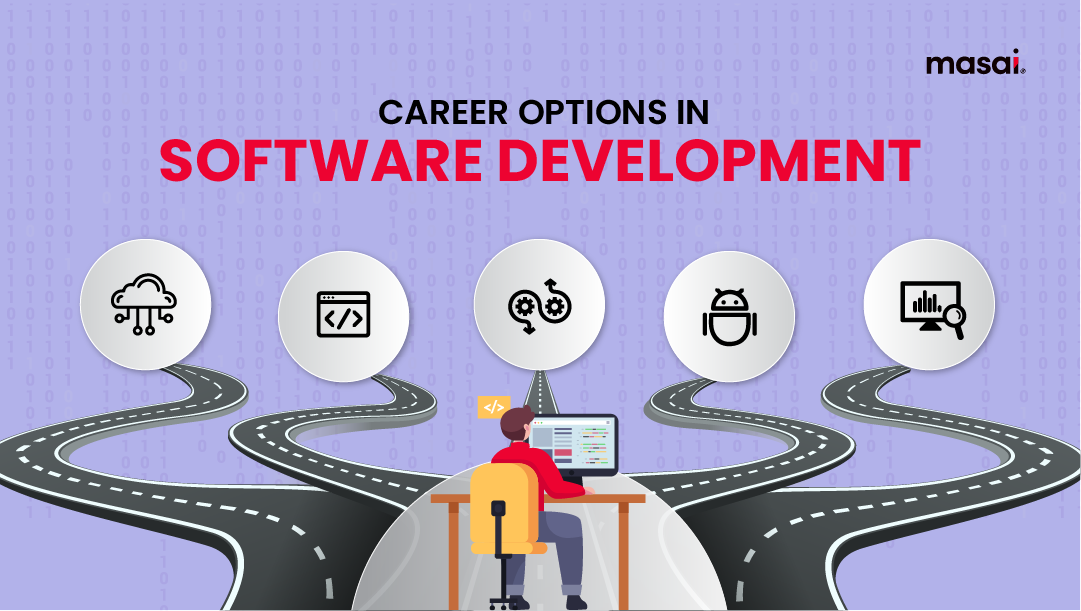
Explore 12 diverse career options in software development, from back-end and front-end developers to mobile developers, game developers, and blockchain developers.
Software Development refers to a set of activities in the vast domain of computer science that involves the creation, design, deployment, and support of software.
We all know that software is a set of programs that tell a computer what to do. Its development is concerned with making computers programmable and maintaining the software.
Now software development in itself is a vast field. There are different varieties of software available today that have all been built from code by software developers.
But why are we telling you all this?
To understand the various roles and career options developers have on their hands.
There are four basic types of software that encompass all the different job roles you hear about in the industry-
- System software - Includes operating systems, disk management, utilities, etc.
- Programming Software - Tools for programmers such as text editors, linkers, debuggers, etc.
- Application software - Includes data management software, security programs, and other web and mobile applications such as Netflix, Instagram, etc.
- Embedded software - Includes telecommunications, cars, industrial bots, and more. (IoT)
Most software developers have the fundamental know-how of software but they specialize in different kinds of roles and responsibilities depending on their skill set, tech stack, or the programming languages and frameworks they're most equipped with.
In this article, we'll discuss the different specializations aka roles and career options in the huge software development field. You'll get to know what's the best fit for you. Stay tuned.
We will explore 12 career options in software development, providing insights into each field's responsibilities, required skills, and growth prospects.
1. Back-End Developer:
Role: Building server-side logic, databases, and APIs to ensure the functionality of web applications.
Skills: Proficiency in back-end languages (e.g., Java, Python), database management, and API development.
Outlook: High demand due to the backbone role in application development.
2. Front-End Developer:
Role: Designing and implementing the user interface, ensuring a seamless and visually appealing experience.
Skills: Mastery of HTML, CSS, JavaScript, responsive design, and user experience (UX) principles.
Outlook: Steady demand as web and app interfaces continue to evolve.
3. Mobile Developer:
Role: Creating applications for Android or iOS platforms, optimising for mobile user experiences.
Skills: Proficiency in platform-specific languages (e.g., Java/Kotlin for Android, Swift/Objective-C for iOS).
Outlook: Growing demand with the proliferation of smartphones and mobile apps.
4. Game Developer:
Role: Designing, coding, and testing video games, from graphics and physics to gameplay mechanics.
Skills: Knowledge of game engines, 3D modelling, animation, and scripting languages.
Outlook: Strong growth, driven by the gaming industry's expansion.
5. Product Manager:
Role: Overseeing the development process, defining product goals, and aligning teams to deliver successful products.
Skills: Strategic thinking, communication, project management, and user-centric approach.
Outlook: Steady demand as companies prioritise user-focused product development.
6. DevOps Engineer:
Role: Bridging development and operations by automating processes and ensuring efficient software delivery.
Skills: Coding/scripting, cloud computing, automation tools, and collaboration.
Outlook: High demand as companies adopt DevOps practices for agility.
7. Embedded Systems Engineer:
Role: Developing software for embedded systems used in devices like IoT, medical devices, and automotive technology.
Skills: Proficiency in programming languages, hardware knowledge, and understanding of IoT.
Outlook: Growing with the expansion of IoT and embedded technology.
8. Cloud Developer:
Role: Managing and optimising cloud-based applications and services for scalability and reliability.
Skills: Cloud platform expertise (e.g., AWS, Azure), coding/scripting, and infrastructure management.
Outlook: Increasing demand as businesses rely on cloud services.
9. Blockchain Developer:
Role: Creating and maintaining blockchain systems, including decentralised applications (dApps) and smart contracts.
Skills: Blockchain fundamentals, programming languages, cryptography, and data structures.
Outlook: Growing in relevance as blockchain technology expands beyond cryptocurrencies.
10. Quality Analyst (QA Engineer):
Role: Ensuring the quality and functionality of software through testing and identifying issues.
Skills: Testing tools, programming for test automation, attention to detail.
Outlook: Steady demand for quality assurance in software development.
11. Operating System (OS) Developer:
Role: Building and maintaining operating systems (e.g., Windows, Linux) for various devices and applications.
Skills: Proficiency in programming languages, problem-solving, and system architecture.
Outlook: Steady demand, especially for specialised OS development.
12. Full-Stack Developer:
Role: Proficient in both front-end and back-end development, capable of creating entire web applications.
Skills: A wide range of programming languages, database management, and versatile problem-solving.
Outlook: Strong demand due to versatility and ability to lead development projects.
Back-end developer
Why did we start with back-end development?
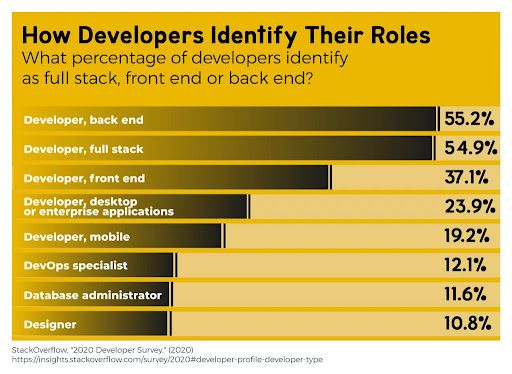
Look at this data piece from the 2020 Developer Survey. Back-end developers are clearly the most demanded professionals in the software industry at present.
Since they are in charge of the server side of the program, back-end developers are regarded as the foundation of the software application development lifecycle.
Back-end development can be a fantastic place to start if you're looking for a solid career in the software development industry. However, you must possess a thorough knowledge of software development procedures.
These experts make sure that end users receive the information and resources they need as soon as possible. The server and the database are the two parts that make up the back end.
The server is in charge of responding to client queries, whereas the database is in charge of storing permanent information (such as user profiles or product listings). For instance, when a user tries to sign into their profile, the server receives the request through a login portal, pipes the user's authentication data to the database, and checks it against a list of accounts.
A back-end software developer's duties include creating reusable scripts and libraries, doing UI testing, troubleshooting, and debugging the application. They also include using the newest technologies to enhance legacy applications.
They collaborate with front-end developers to establish objectives and write more functional and logical codes.
Back-end programmers interact directly with data, APIs, and other back-end procedures. Let’s look at a few other skills required to be a back-end developer:
- Knowledge of back-end languages such as Java, Python, and PHP
- Basic knowledge of front-end technology
- Understanding of back-end frameworks such as NodeJs, ExpressJs, and Django
- Understanding of databases (SQL, MongoDB)
- Knowledge of APIs
- Server handling
Full-Stack Developers
Then comes the jack of all trades- a full-stack developer.
Ask a full-stack developer how the entire operation functions and they’ll tell you everything. They can code an entire program or contribute to the UI and infrastructure development of a software development team because they are proficient in both front-end and back-end technologies.
The term “full-stack” refers to the entire base of programming languages, technologies, and frameworks that are needed to set up a website and maintain its functionality.
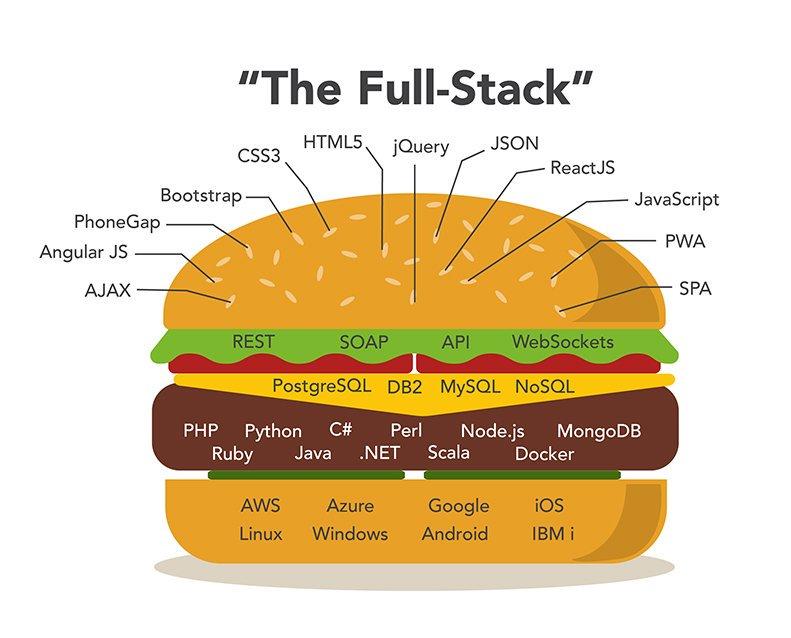
Interestingly, perhaps shockingly, this position didn't even exist a few years ago. To achieve various development goals, businesses had to employ a variety of personnel.
But considering the adaptability and leadership skills of a full-stack developer, demand has increased over the past few years. Today, leading tech firms are willing to pay a premium for the position.
You need skills all around the stack to be a full-stack developer-
- Front-end languages- HTML/CSS, JavaScript, XML
- Back-end languages- PHP, Ruby, C#, Java, and Python
- Database- MySQL, MongoDB
- Data structures & Algorithms
- HTTP/HTTPS & Rest API
Front-end developer
If a back-end developer joins the bricks of a house, the front-end developer does the painting and decor stuff. They code the client side of a web application or a website which we mostly interact with.
They’re also in charge of balancing the functional elements on a webpage.
Front-end developers ensure that the web layout will display well across various screens, such as tablets, laptops, desktops, and smartphones.
Modern front-end engineers must strike a careful balance when designing for structure, usefulness, and aesthetics.
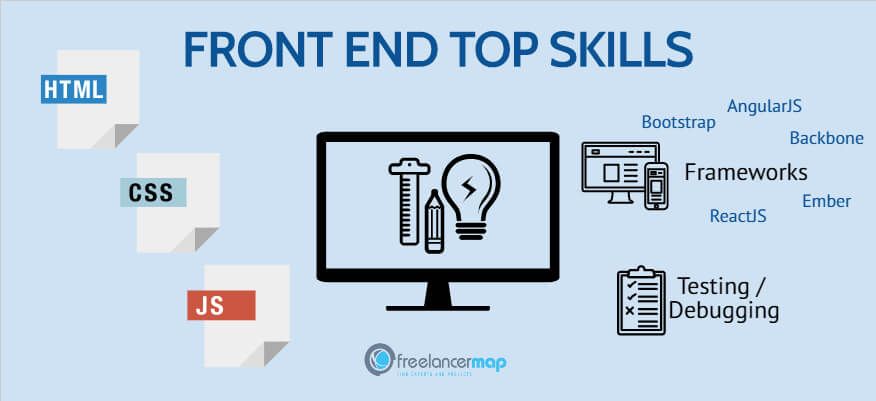
A front-end developer needs to be equipped with what we call the building blocks of web development- HTML, CSS, and JavaScript. Besides, they also need the following skills:
- Responsive design
- Version control
- Testing/Debugging
- Browser developer tools
- Search engine optimization
Mobile Developer
Mobile developers, as you might have guessed from the name, make software exclusively for mobile devices, either cross-platform or native. These programmers create apps that are specifically designed for mobile platforms like Android and iOS.
There is no denying the high need for mobile developers today and in the future. Statista data indicates that 204 billion mobile app downloads took place just in 2019. Any company that runs an internet website or web service will use a mobile app, and they might want to create particular mobile applications internally.
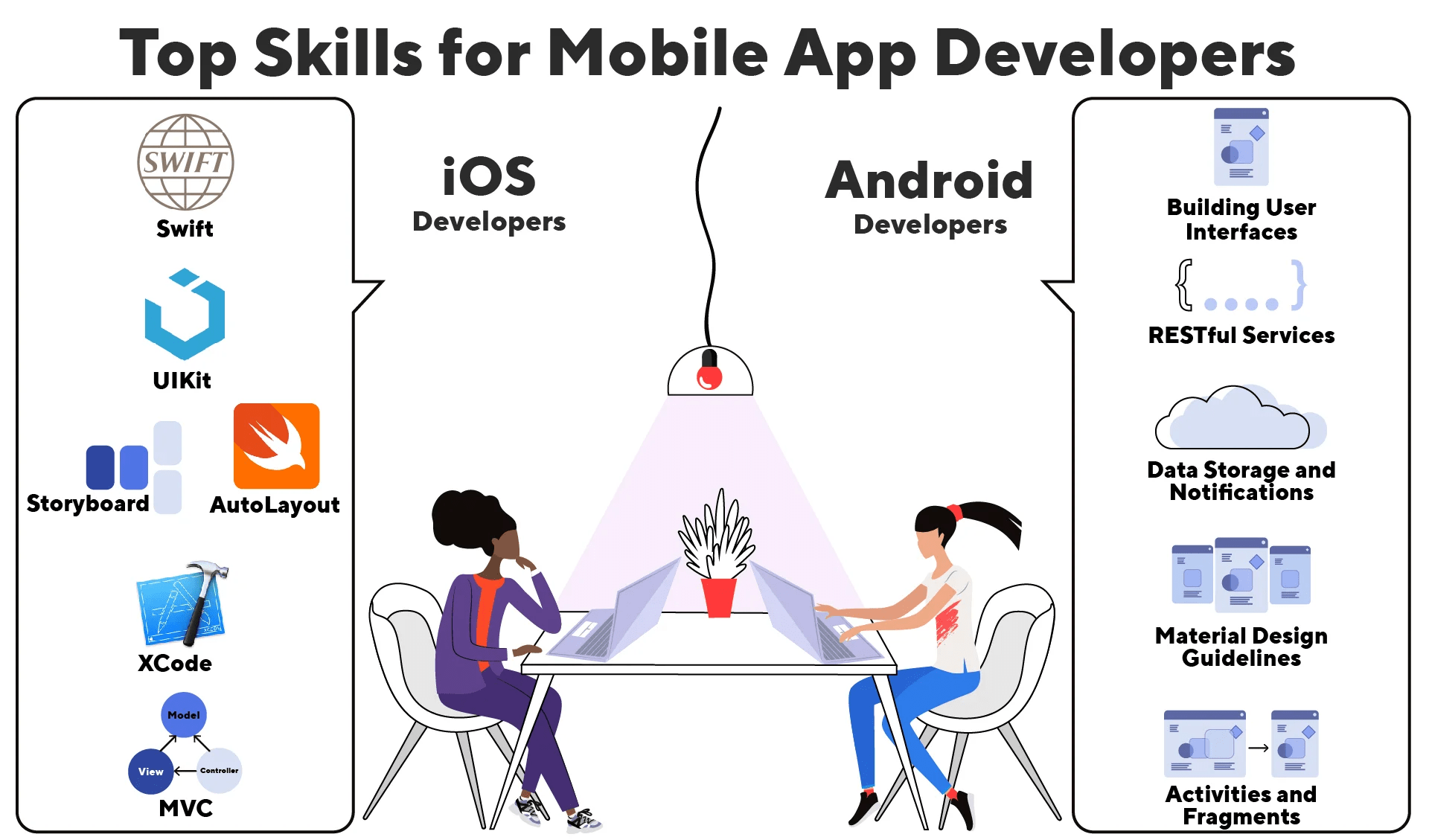
If you want to be an iOS developer, you need to learn a few languages outside of programming’s common core such as the likes of Swift and Objective-C. You also need to be adept with UI frameworks namely UIKit and SwiftUI, complimented by toolsets AppCode, and XCode.
For android development, you need languages such as Java or Kotlin, along with frameworks AndroidUI and Jetpack Compose.
Game developer
Let’s be honest, while spending our days and nights on games in our childhood, we did wonder- “What if we build such games on our own in the future?”. We were so fascinated by games.
If you've always wanted to work in the tough field of game development, you should be familiar with some of its technical components of it. The internet is awash with job prospects for software developers, and for individuals looking for a stimulating and exciting career, game development can be a perfect choice.
Game developers are in charge of building the game engine and turning specifications into challenging but clean code. Their main duties include creating prototypes, animating characters, and writing game scripting.
APIs, libraries, 3D animation, artificial intelligence, 3D rendering, and other programming skills must all be well understood by a skilled developer.
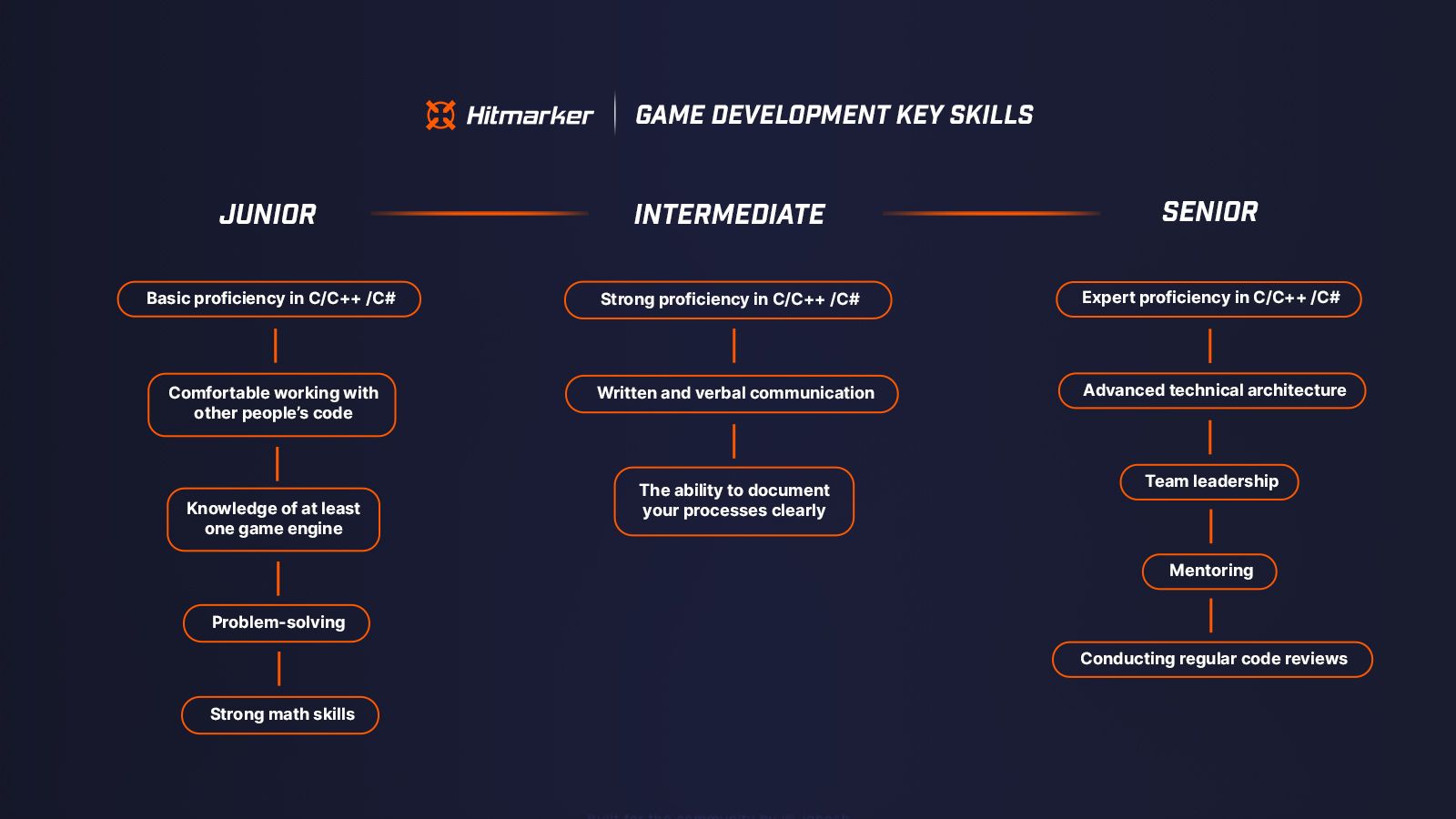
By 2027, the market for video game developers is projected to be worth USD 1,863.53 million (Source). A game developer may earn up to 13.3 LPA more than the average pay of 4.5 LPA (Source). Depending on factors like experience, skill set, seniority level, and other factors, the remuneration could be higher.
OS developer
Operating system developers build and maintain the underlying software that runs devices. For example, Microsoft Windows, macOS, and Linux are all operating systems built and maintained by OS developers.
And not just that, there are some advanced machines, and industrial robots that need their own operating systems, and there are engineers who specialize in such feats.
In a way, they serve as a foundation upon which other application and software developers build to create a fully working virtual workspace for business operations, everyday tasks, and finances.
System developers frequently create solutions and construct software for HR and online banking systems, for instance, to make sure everything functions properly without human input.
They may directly work on operating systems or the back-end of applications depending on their area of specialization. Their roles and responsibilities may include:
- Building the servers using hardware components, installing the OS and support stack, and putting them into production.
- Establishing emergency response protocols and documenting custom mainframe tools for faculty members to use independently.
- Analyze current departmental processes and suggest modifications to produce a database for future system development and training.
- Testing and evaluating new OS launches, proprietary, and other third-party software products.
Here are a few skills needed to be a system developer:
- Proficiency in programming languages such as C# and Java
- Mathematical aptitude and problem-solving skills
- Good organizational, teamwork, and time management skills
- Good knowledge of the latest trends and their effect on the industry
- Attention to detail
Quality Analyst
Quality analysts are also addressed as test engineers and quality assurance analysts.
They are in charge of evaluating digital systems, programs, applications, and other items. A product's assessment assures that it is free of any technical flaws, problems, and bugs and that it satisfies all requirements for quality.
One of the most important tasks for quality analyst engineers is creating the design and execution strategy for test plans.
They are also responsible for monitoring the design phase and improving the development process by identifying software application issues early on.
Since there has been a significant uptick in the creation of innovative products and technologies, there has been significant growth in the demand for qualified analysts.
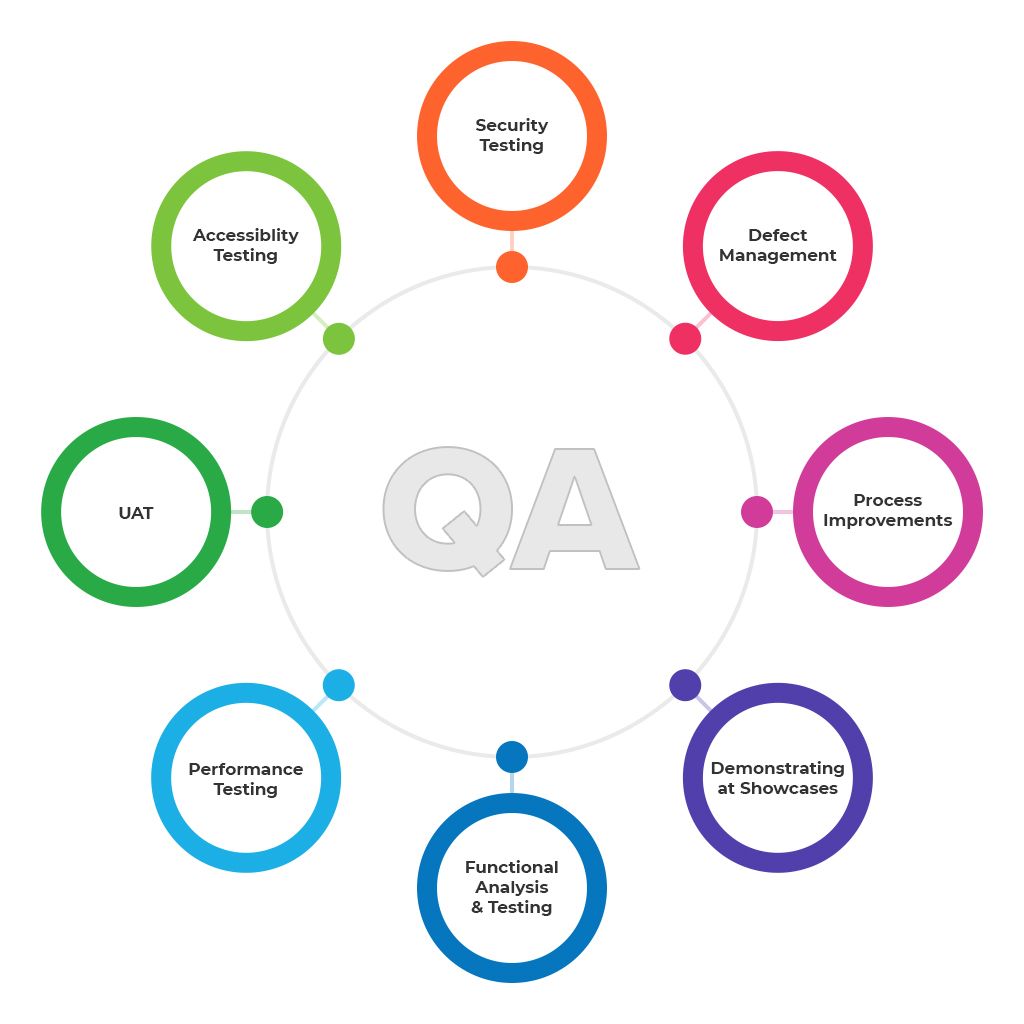
Here are the important skills needed to be a QA Engineer:
- Able to perform UI test automation using programming languages such as Java, C#, Python, Ruby, etc.
- Adept with using test management tools such as TestRail, TestFLO for Jira, VersionOne, etc.
- Adept with bug-testing tools such as BugHerd, Mantis Bug Tracker, Asana, Marker.io, and Stryka
- Good understanding of systems’ specifications
- Great attention to detail
Product Manager
The product manager has been a rather perplexing position in the industry for some time.
Some people think that a product manager's role is to create and prioritize hypotheses, and turn them into knowledge through A/B tests and research.
While, some also believe that a product manager's duties include creating features, enhancing product metrics, and acting as a user’s advocate.
In reality, product management encompasses all these mentioned responsibilities. They pinpoint the customer’s need and large-scale business goals that a product will address, envisions the product’s success, and rallies a team to make that vision a reality.
No wonder, it was placed at the intersection of technology, business, and user experience in a venn diagram by the extraordinary product leader and founder of Product Tank, Martin Eriksson.
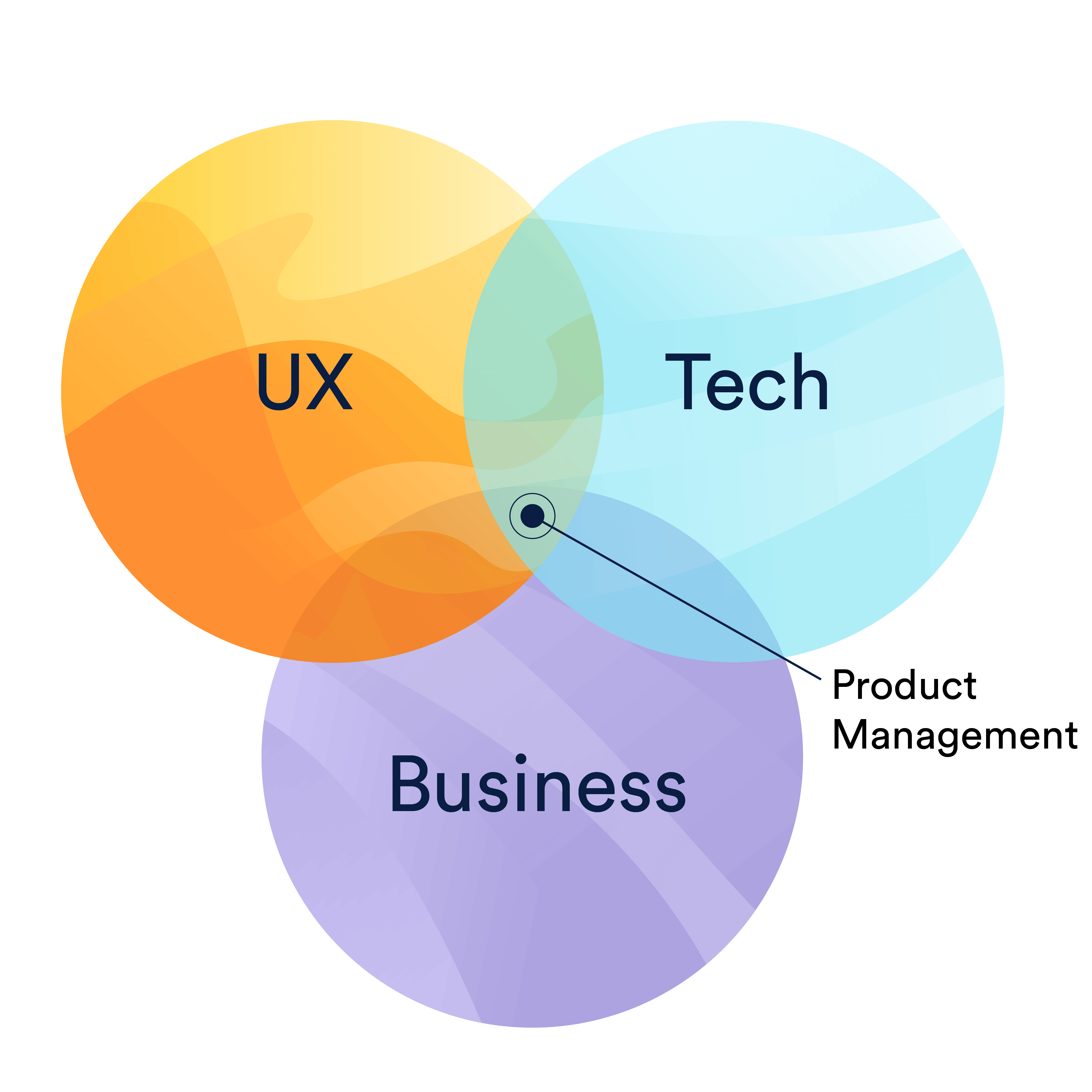
The diagram clearly shows how a product manager needs to maintain the balance between the three aspects of a product.
Their responsibilities also vary depending on the size of the organization. In large companies, they work around with people in specialist positions such as analysts, marketers, developers, and designers, and align all these stakeholders behind a defined vision. Whereas, in smaller organizations they do more of the hands-on work.
Does a product manager need technical skills?
Though it’s not hard-line mandatory, having technical skills does greatly benefit a product manager, especially if they’re working in the software industry. It helps in better understanding of resource needs, timelines for development, how to priortize roadmap and manage stakeholder expectations.
Most product managers today come from a technical path such as Computer Science, Software Applications, among others.
That being cleared, here are a few roles and responsibilities of a product manager:
- Outlines the direction, strategy, and vision for the product
- Collects, organises, and ranks market and customer needs
- Ensures business case and customer satisfaction goals are accomplished by collaborating closely with engineering, sales, marketing, and support
- Fosters a common brain among larger teams to encourage independent decision-making
DevOps Engineer
DevOps, as the name suggests, integrates the roles and responsibilities of development and operations.
DevOps Engineers work closely on code with the developer team, oversee the code releases, manage the deployment and then work on the integration and operation of the developed software, in collaboration with the operations team.
In a nutshell, they bridge the gap between development and operations and ensure that the process is flawless from end to end.
Depending on the software development project and team, the DevOps engineer's responsibilities may lean more toward operations or toward development.
A DevOps engineer needs to possess the following skills:
- Coding and scripting skills - Python, Ruby, Java, Javascript, PHP, Bash, Shell, and Node.js are among the most important programming/scripting languages for DevOps
- Cloud computing - DevOps efficiency depends on the cloud as it provides the necessary platform to perform tests, deploy and release code.
- Automation skills- For automating the entire DevOps pipeline, including CI/CD cycles, and app performance monitoring, among others
- Communication & collaboration skills - To ensure seamless communication between the Dev and Ops team and to promote DevOps culture cross-functionally
- Testing Skills- It is at the heart of DevOps. Tests must function flawlessly without fail in the DevOps automation process
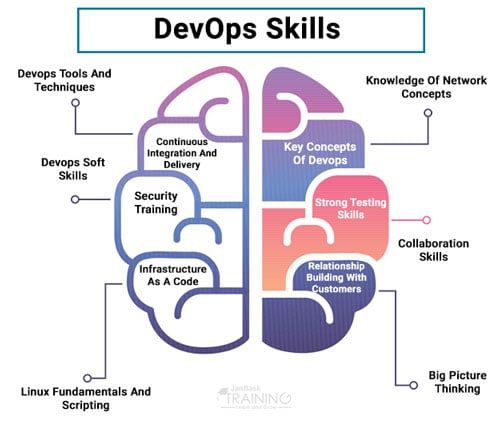
Additionally, new roles like DevSecOps, GitOps, AIOps, FinOps, NoOps, or ModelOps have emerged in the IT industry, underscoring the necessity for new skill sets and the role of the DevOps engineer.
Whatever the role is, the idea of shared responsibility is at the core of DevOps culture.
Embedded Systems Engineer
Embedded systems are collections of hardware elements and software programs created to carry out particular functions.
Analog sensors, microprocessors, microcontrollers, and other components are a few examples of embedded systems.
They are frequently used in medical science, consumer electronics, manufacturing science, aviation, and automotive technology.
An embedded systems engineer contributes to the design, creation, and maintenance of embedded systems in products. Software development is frequently a part of the role.
You will need to have a broad knowledge of programming languages like Assembly language, Python, ADA, Rust, C, C++, etc. to start your career in embedded software engineering. Besides, you’ll need:
- Software optimizations skills at the System on a Chip (SoC) level
- Knowledge of design patterns and embedded system design patterns
- A decent understanding of the Internet of Things (IoT) and internet-based technologies
- Understanding of data structures
- Experience in communication protocols
Cloud Developers
Similar to software developers, cloud developers create apps on virtual machines commonly referred to as the cloud. Undoubtedly, it is a worthwhile career option to consider in software development.
A cloud developer is responsible for managing and overseeing the company's IaaS, SaaS, or PaaS cloud service delivery model. The need for cloud developers is suddenly increasing as small to large businesses use cloud architecture for storing their mission-critical data and running apps for anytime, anywhere access.
As a cloud developer, you will be in charge of managing and keeping an eye on the Cloud architecture, scaling applications, and systems, analyzing security issues, governing access permissions, and optimizing apps, among other things.
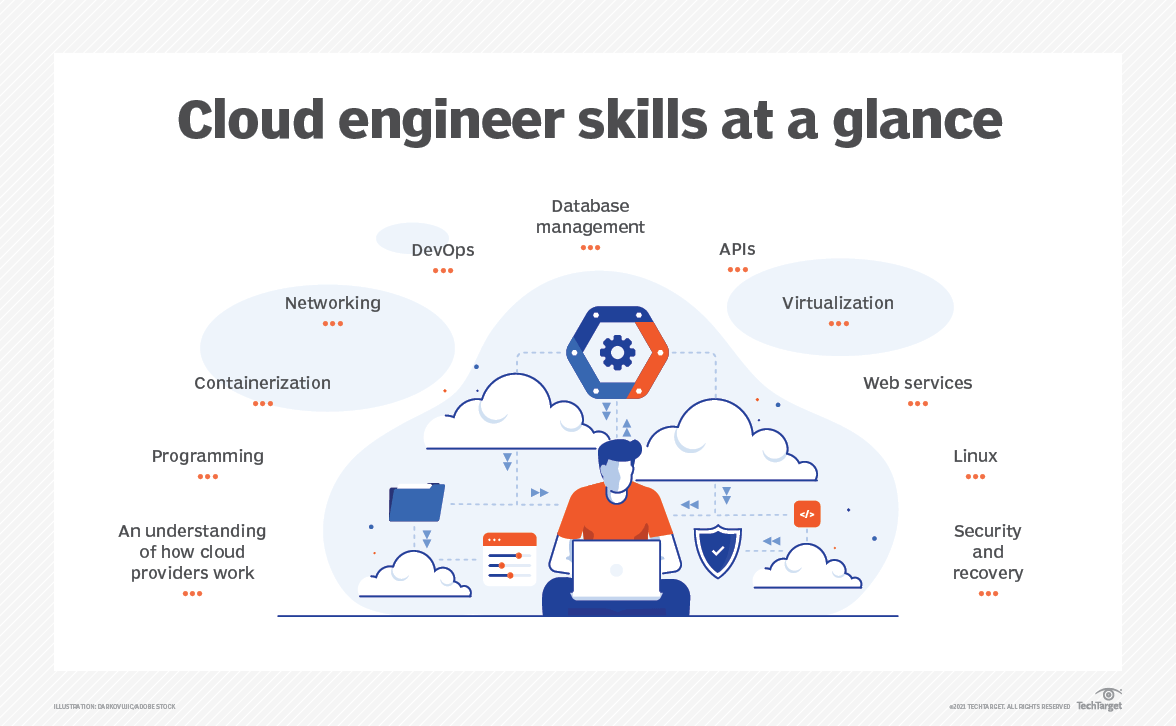
Blockchain Developer
Blockchain development is another career that has emerged over the last 5 years and is surely here to stay. It refers to building, maintaining, and designing blockchain systems and applications. But what is blockchain?
It is a database that stores and organizes digitally formatted data into clusters or blocks, each having a finite storage capacity.
A blockchain developer understands the architecture and protocols of the technology and creates decentralized applications (dApps) and smart contracts based on blockchain technology. They are in charge of creating 3D designs, 3D models, and 3D content for things like video games.
They’re categorized into two primary types:
Core Blockchain Developer - The architecture of blockchain systems is created and maintained by core blockchain developers. They create security patterns, build protocols, and manage the entire network.
Blockchain software developers- They create applications on top of pre-existing systems. They take care of development, design, and maintenance for the front-end and back-end.
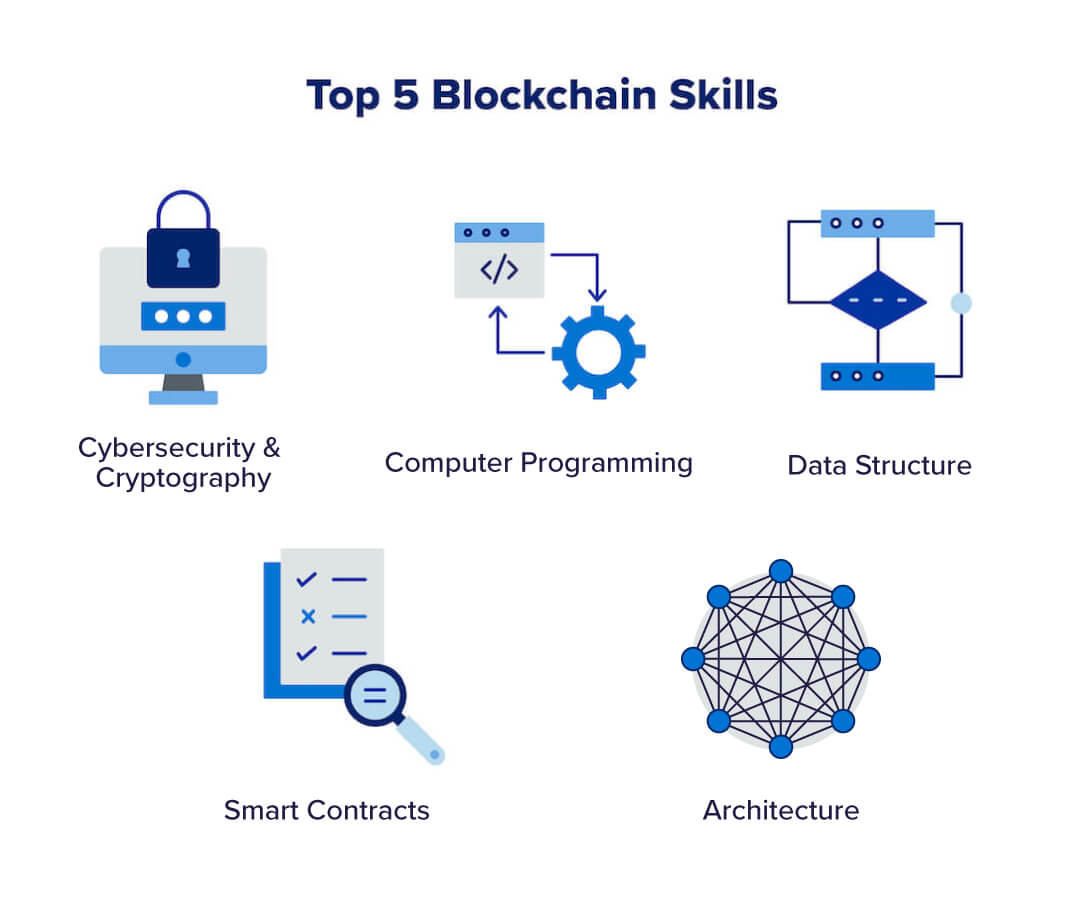
How do you become a blockchain developer?
- Understanding the fundamentals of blockchain
- Learn programming languages used in blockchain development like Python
- Good knowledge of cryptography and smart contracts
- Understanding of data structures and blockchain architectures
Final Thoughts
Here's the bottom line: You have multiple ways to enter into a software development profession. It all comes down to the kind of work you're interested in, and the skills you have in your repertoire. All of these professions are well-paid opportunities without a doubt.
The important thing is to keep upgrading your skills no matter which career path you choose. That way you can also venture into different areas of development and experience proportional growth in your career.
Cheers!
Frequently Asked Questions
What is the average salary for a back-end developer?
The average salary for a back-end developer varies by location and experience but is typically in the range of $70,000 to $120,000 per year.
What skills are essential for a front-end developer?
Front-end developers need proficiency in HTML, CSS, JavaScript, responsive design, and a strong understanding of user interface development.
What programming languages are commonly used in mobile app development?
For iOS, Swift and Objective-C are popular, while Android development often involves Java or Kotlin as primary programming languages.
What is the job outlook for game developers?
Game development is a growing field with a strong job outlook. By 2027, the industry will be worth over $1.8 billion.
What are the key skills needed to become a blockchain developer?
Blockchain developers should have a solid grasp of blockchain fundamentals, programming languages like Python, cryptography, and smart contract development expertise.

